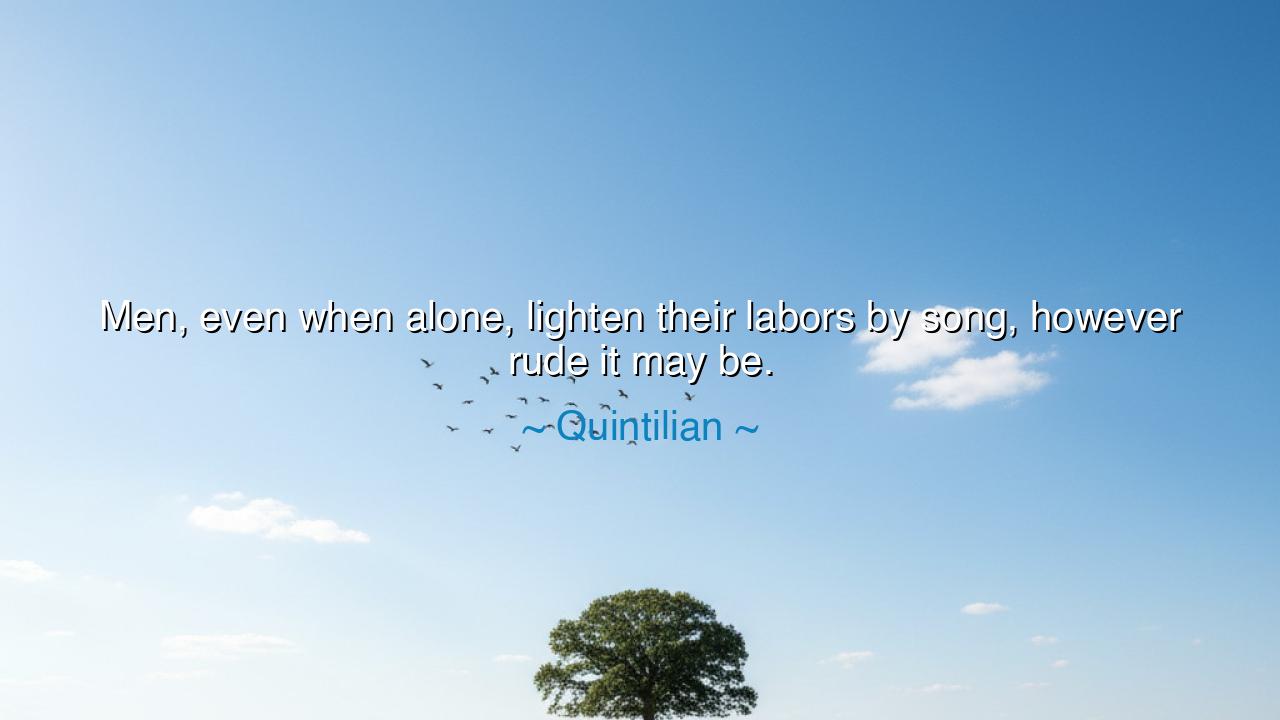
Men, even when alone, lighten their labors by song, however rude






"Men, even when alone, lighten their labors by song, however rude it may be." These words by Quintilian, the renowned Roman rhetorician, touch upon the deep connection between work and creativity, and the way in which human beings find comfort and meaning even in the most mundane tasks. Whether in the fields, on a long journey, or in the solitude of one's work, the act of singing—even in its most rudimentary form—provides a means of relief, expression, and spiritual sustenance. Quintilian’s insight speaks to the innate human need to find joy, even in the hardest labor, and how song, no matter how simple, can elevate the soul and transform the nature of work itself.
In the ancient world, the connection between song and work was a powerful theme. Homer, in the Iliad and the Odyssey, often depicted the lives of ordinary people—fishermen, farmers, and soldiers—who would sing songs to accompany their labor and to bring rhythm and meaning to their lives. The idea of song as solace was not just for those in leisure but was integral to survival, especially in the harsh environments that defined much of ancient existence. Whether through epic chants in battle or simple melodies in the fields, song acted as both motivation and comfort, helping individuals endure and even find joy in their work. This sentiment of song as a means of lightening the burden of labor is embedded deeply in the psyche of humankind.
The Romans, too, recognized the power of song in labor. Virgil’s Aeneid is filled with imagery of workers singing as they go about their tasks. In his work, Virgil often portrays the laborers of the founding of Rome as singing, their voices intertwined with the Rhythms of Rome's emerging greatness. This was more than mere entertainment; it was a connection to the spirit of the land and the community that bound them together in their efforts. To work in silence, without the uplifting force of song, would have been unimaginable for the Romans, who believed that song infused not only labor but also life itself with meaning.
The act of singing while laboring can also be found in the story of the building of the Great Wall of China. In ancient times, workers would sing as they carried heavy stones up the rugged terrain, each note echoing the collective strength and resolve of the people. Songs of perseverance were passed down from generation to generation, sung to keep morale high and to mark the rhythm of their toil. These songs transformed a grueling and seemingly endless task into a collective celebration of unity and determination. Much like Quintilian's observation, the workers were lightening the burden of their labor with the power of song, creating a bridge between the physical and spiritual aspects of their work.
Consider also the American slaves who, despite the harsh conditions they endured, sang spirituals to give rhythm to their labor. These songs, born out of their suffering, were not just melodies but a form of resistance and resilience. Songs like “Swing Low, Sweet Chariot” and “Wade in the Water” were not only expressions of faith but ways of surviving the most oppressive labor. The songs helped them endure the brutality of their work, while also connecting them to their ancestors and their hope for freedom. The act of singing, no matter how simple or rude, served as a shield against the emotional toll of their labor and an expression of dignity and humanity in the face of unimaginable hardship.
The lesson in Quintilian's words is one of empowerment through expression. It reminds us that, no matter how difficult the task or solitary the labor, we can transform our work by integrating creativity and joy into it. Whether through song, art, or humor, the human spirit thrives when it finds ways to bring meaning and connection into the everyday. In our own lives, when we face challenges—be it in work, personal struggles, or life’s trials—we can look to Quintilian’s wisdom. If we are able to find a way to sing through our struggles, to find purpose in what seems mundane, we can elevate even the heaviest burdens and make them bearable.
Let us then embrace the power of song, of creativity, in our daily tasks. Whether it is through singing, speaking our truth, or finding a creative outlet in our work, we can lighten our labors and transform our daily existence. Song can be a metaphor for anything that brings joy and connection into our lives. Just as the ancients and those throughout history used song to lighten their work, we can find our own ways to sing, to infuse our challenges with meaning, and to create a rhythm that carries us through life. When we do this, we move from mere existence to living with purpose, carrying our burdens not with grief but with lightness and hope.






AAdministratorAdministrator
Welcome, honored guests. Please leave a comment, we will respond soon